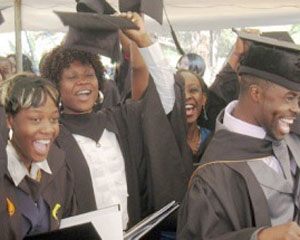
We were in a discussion one day with a learned friend in diaspora and he was sharing with us how Zimbabwean experts are respected on the international market.
JUSTOCE MATTERS BY DZIKAMAI BERE & PROSPER MAGUCHU
Having a very high literacy rate, we certainly rank among the most educated societies in the world. The question that worries us is that if Zimbabweans are so educated, how come we cannot solve our own problems.
A colleague joked and said our intelligence is only in writing poetry, jokes and drawing cartoons about our suffering. She hit our ego below the belt, but perhaps what she was saying was that our high literacy rate is useless if it does not translate to solutions for our society.
We may as well be illiterate. Surely, in this modern day, literacy has to mean more than just the ability to read and write one’s own name.
But again when we look at great Zimbabwean personalities that make it big on a global stage, one thinks — maybe we are not that illiterate after all. We think of people like James Manyika who in December 2012 was appointed into the United States President’s Global Development Council.
We think of accomplished persons like Strive Masiyiwa, among many other outstanding Zimbos. When you travel the world over, you meet Zimbabweans in key positions, solving other people’s problems.
Following the debate on the mid-term fiscal policy review we realise that the two persons coming head-on in the Parliament are not economists, but lawyers; Tendai Biti and Patrick Chinamasa. And we ask, is our country, the one deploying experts around the world, and short of economists?
- Chamisa under fire over US$120K donation
- Mavhunga puts DeMbare into Chibuku quarterfinals
- Pension funds bet on Cabora Bassa oilfields
- Councils defy govt fire tender directive
Keep Reading
We only read their very good analyses but where are they when we need people to solve our problems? We think of people like the late Erich Bloch (may his soul rest in peace) who was one of the most respected economic analysts.
These examples seem to suggest that we are not at all illiterate, but perhaps our politics is too dirty such that our experts don’t want to get involved.
But perhaps the greater challenge is that our universities are not serving the people. It is both a cultural challenge as well as an institutional challenge which a more proactive academic community can solve.
Our academic institutions have to develop a community-solutions-oriented approach in order to serve better the society.
The area of social justice is probably the most neglected area. The reason for that is our poisoned political atmosphere treats social justice as a political subject and institutions and academics that are qualified to speak to justice issues seek to avoid getting dirty.
We have to emphasise that failure by justice related academic faculties to undertake practical justice projects has contributed to our justice deficit. Our faculties have failed to get out of the classroom as much as they should.
For inspiration, we look into the region and we see the immense contribution of institutions like the Centre for Human Rights at the University of Pretoria which has been key to the advancement of human rights training for both state and non-state actors at both local and international level. Such initiatives transform institutions of higher learning into service centres for a society in search of justice.
Some may argue that South Africa is a more open society for academic institutions to be more creative with social justice programmes. We must take note that the Centre for Human Rights was established in 1986 when South Africa was still under the apartheid regime.
The more the repression, the more the need for action! Our academic institutions must rise to this need for increased knowledge dissemination, demand for justice and equipping practitioners with practical tools for emerging justice issues.
Another source of inspiration in a situation like ours is the Refugee Law Project at the University of Makerere in Uganda. This project has become a beacon of hope all over Africa that in the midst of repression, academic institutions can provide society with a rare resilience that drives the justice agenda forward.
In Zimbabwe, it does appear like academic institutions have not provided that hope. With the exception of a few, like the privately run Institute of Peace Leadership and Governance at Africa University, and the Centre for Minority Rights Protection by University of Zimbabwe lecturer and Legal Practitioner Innocent Maja, the majority of institutions remain locked up in their classrooms. State control of academic institutions is not an excuse for justice practitioners not to serve.
Private institutions like Arrupe College run by the Jesuits, Catholic University and Solusi University are possible platforms for justice actors to start innovative programmes that contribute at a practical level to the advancement of justice.
But this does not stop us from encouraging the authorities to reform state academic institutions to allow for more justice oriented growth and academic development that benefits ordinary Zimbabwean. This is part of the broad institutional reform agenda for transitional justice.
If academic institutions do not reform in the way suggested, we then ask, of what use is education if it cannot respond to the justice needs of the society? Of what use is our high literacy, if we cannot comprehend our own issues and unlock solutions for our people?
lDzikamai Bere and Prosper Maguchu contribute to this column in their personal capacity. The views contained here are not the views of the organisations they are associated with. For feedback write to [email protected]











